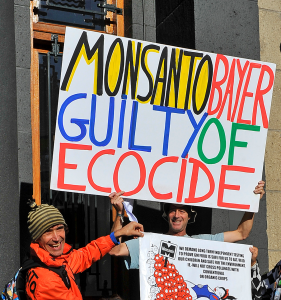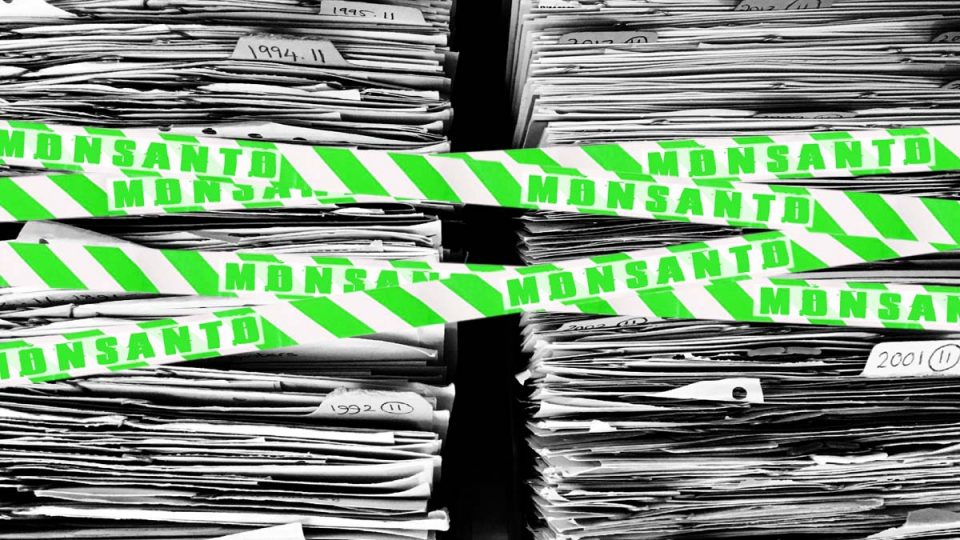- Have any questions? Contact us!
- info@dr-rath-foundation.org

Who Knows What’s Best For Your Children?
April 13, 2017
Brussels EU Regulators Blatantly Ignoring Toxic Effects Of Pesticide Cocktails In Foods
April 27, 2017International Tribunal Accuses Monsanto Of Committing ‘Ecocide’

Following a two-day hearing held in the Netherlands in October 2016, five international judges have accused Monsanto of engaging in “practices which have negatively impacted the right to a healthy environment, the right to food, and the right to health.” In their advisory opinion, published on 18 April 2017, they stated that were the crime of ‘Ecocide’ to be recognized in international law, the facts reported to them could fall within the jurisdiction of the International Criminal Court. Calling for the primacy of international human and environmental rights law to be asserted, the judges wrote that “the time is ripe to consider multinational enterprises as subjects of law that could be sued in the case of infringement of fundamental rights.”
Convened by civil society groups, the tribunal heard from a total of almost 30 witnesses from 16 countries. After examining evidence relating to the dissemination of “dangerous agrochemicals in industrial agriculture;” “the engineering, production, introduction, and release of genetically engineered crops;” and “the introduction of persistent organic pollutants such as PCB into the environment,” the judges emphatically concluded that “Monsanto’s activities and products cause damage to soil, water and to the environment” and that its conduct has “negatively affected the right to health.”
Infringements on our rights
 Notably, the specific questions examined by the tribunal included issues relating to corporate infringements on the right to a healthy environment, the right to food, the right to health, and the right to freedom of scientific research; as well as complicity in war crimes, and ecocide. For well over a decade now, these same issues have been central to the work of our Foundation. Many of them, for example, were explicitly referred to in the Call For A Europe For The People, By The People proposed by survivors of Auschwitz and other Nazi concentration camps at a conference held jointly with our Foundation in 2007.
Notably, the specific questions examined by the tribunal included issues relating to corporate infringements on the right to a healthy environment, the right to food, the right to health, and the right to freedom of scientific research; as well as complicity in war crimes, and ecocide. For well over a decade now, these same issues have been central to the work of our Foundation. Many of them, for example, were explicitly referred to in the Call For A Europe For The People, By The People proposed by survivors of Auschwitz and other Nazi concentration camps at a conference held jointly with our Foundation in 2007.
Additionally, in our Complaint submitted to the International Criminal Court in 2003, we directly accused representatives of the pharmaceutical and petrochemical sectors, and their stakeholders, of causing injury to and the deaths of millions of people through the ‘business with disease’, war crimes, and other crimes against humanity. As we said at the time, every day that formal proceedings against those we accused are delayed, millions of people will pay with their lives and the world will move closer to the next global war. Looking around today, the current geopolitical situation hardly reassures us that this analysis was incorrect.
Learning the lessons of history
With Monsanto currently in the process of being sold to the German pharmaceutical, chemical, and biotech company Bayer for the sum of $66 billion, the conclusions reached by this international tribunal are clearly of enormous relevance to the health and lives of billions of people throughout the world. For anyone in any doubt about what can happen when companies seek to establish global monopolies based on patented products that define the human body as a marketplace, one need only look back at the lessons of history.
As my colleagues and I described in our 2010 book, The Nazi Roots of the Brussels EU, twice before – in WWI and WWII – Bayer and other pharmaceutical, chemical, and petrochemical companies took the world into the abyss. During those two wars, more than one hundred million people lost their lives as a direct result of the insatiable greed of these corporate interests and their quest for global control. Recognizing this, in his speech at the 2007 conference held jointly with survivors of Auschwitz and other Nazi concentration camps, Dr. Rath stated the following:
“Only if we point out the corporate interests behind World War II will this and future generations be able to secure peace on our planet. Only if we identify the ‘business with disease’, with our food, with fossil energy as the biggest obstacle for a better world, will we be able to build such a world of health, peace and human rights.”
Progressing to a world of health, peace, and social justice will require each of us to stand up and defend those very same fundamental rights that multinational corporations are seeking to take away from us. No less importantly, it will also require our political representatives to decide whose interests they really represent. In the years ahead, politicians who continue to place corporate interests before the welfare of citizens will inevitably be removed from office. Meantime, never doubt that Monsanto and other corporate interests will eventually be held to account for the damage they are inflicting on human health, human rights, and the environment. As this Dutch tribunal has shown us, it’s now just a matter of time.




